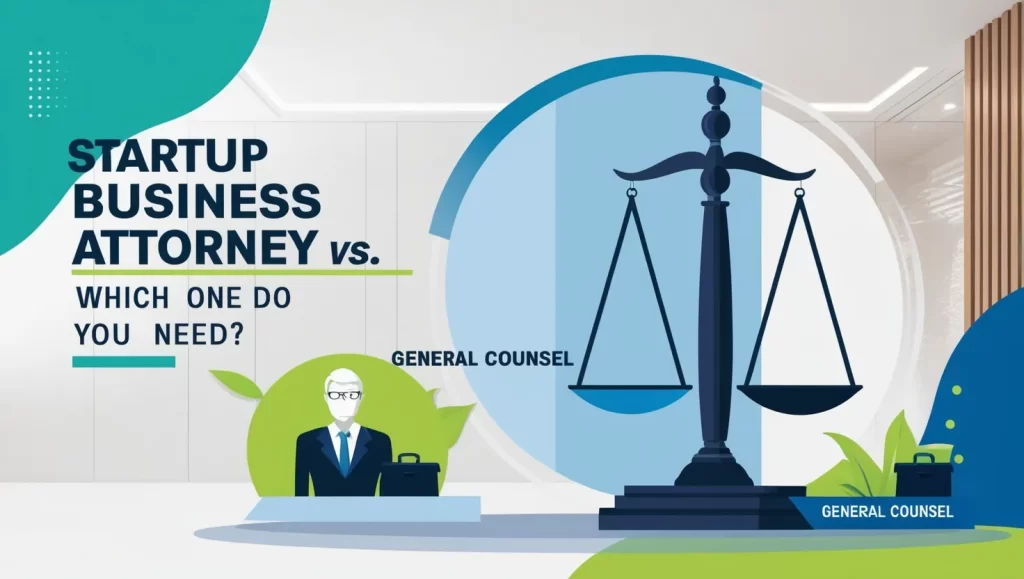
Startup Business Attorney vs. General Counsel: Which One Do You Need?
Startup Business Attorney vs. General Counsel: Which One Do You Need?-When launching a startup, legal matters are bound to come up—whether it’s setting up the business structure, drafting contracts, or ensuring intellectual property is protected. As an entrepreneur, you’ll likely face the dilemma of choosing between hiring a Startup Business Attorney or bringing a General Counsel on board. Both roles are essential to the legal well-being of your business, but they serve different purposes. Understanding the differences between a Startup Business Attorney and a General Counsel can help you make the right decision based on your business’s needs.
What Is a Startup Business Attorney?
A Startup Business Attorney specializes in the legal issues unique to early-stage companies. They typically work with entrepreneurs during the crucial formative stages of business development. Whether you are incorporating your startup, protecting your intellectual property, or negotiating contracts, a Startup Business Attorney provides guidance tailored specifically to startups.
This type of attorney can help you choose the right business structure, navigate regulatory requirements, and avoid common pitfalls that could derail your business before it even gets off the ground. Their expertise lies in providing legal support that enables you to focus on growing your business without worrying about legal liabilities.
Key Functions of a Startup Business Attorney
- Business Formation: A Startup Business Attorney will help you determine the most appropriate business structure (LLC, corporation, etc.) based on your startup’s goals and needs.
- Intellectual Property Protection: They can help you protect your brand, logo, patents, and copyrights, ensuring that your intellectual property is legally safeguarded.
- Contract Drafting and Review: Startups rely heavily on contracts with employees, vendors, and customers. A Startup Business Attorney will make sure these contracts are enforceable and in your best interest.
- Compliance Issues: A Startup Business Attorney ensures your business complies with local, state, and federal regulations to avoid costly fines or lawsuits.
- Employment Law: As your startup hires employees, a Startup Business Attorney can help with employment contracts, employee policies, and legal requirements.
What Is a General Counsel?

A General Counsel (GC) is a senior-level executive who oversees the legal department of a business. While a Startup Business Attorney typically handles short-term legal issues during the startup phase, a General Counsel plays a more long-term, strategic role in the company. A General Counsel is often employed full-time and works as an in-house attorney, providing ongoing legal guidance as the business grows.
The role of a General Counsel extends beyond legal advice. They manage legal risks, handle complex corporate matters, and lead teams of legal professionals within the organization. General Counsel are particularly valuable for companies that have reached a certain scale and require continuous legal oversight across various aspects of the business.
Key Functions of a General Counsel
- Corporate Governance: A General Counsel ensures the company adheres to its legal obligations regarding corporate governance, shareholder relations, and regulatory compliance.
- Litigation Management: They manage any ongoing litigation or potential disputes that could impact the business, hiring outside counsel when needed.
- Strategic Counsel: A General Counsel provides ongoing legal advice to senior management, particularly when it comes to scaling the business, mergers and acquisitions, and risk management.
- Contract and IP Oversight: A General Counsel monitors ongoing contractual relationships and intellectual property matters, ensuring legal consistency and strategy alignment.
- Employee and Labor Law: As a company grows, so does its employee base. A General Counsel manages complex labor law issues and internal policies to protect the business.
Key Differences Between a Startup Business Attorney and a General Counsel

While both roles offer essential legal support, there are a few distinct differences in how a Startup Business Attorney and General Counsel serve your business.
1. Stage of Business
The most significant difference between a Startup Business Attorney and a General Counsel lies in the stage of business. A Startup Business Attorney is most useful when you are in the early stages of launching and growing your startup. They help you lay the legal groundwork by advising on formation, contracts, intellectual property, and initial compliance issues.
On the other hand, a General Counsel is typically brought on board once your business has grown beyond the startup phase. As your company expands and faces more complex legal challenges, a General Counsel is able to provide broader strategic legal oversight. This position is ideal for businesses that have matured and need ongoing, in-house legal management.
2. Scope of Work
The scope of work for a Startup Business Attorney is more focused on specific legal issues, typically involving the startup’s formation, regulatory compliance, and early-stage contracts. They work on a project basis and can handle short-term, defined tasks related to getting the business off the ground.
A General Counsel, however, handles a broader range of legal matters, including managing legal risks, overseeing litigation, advising on corporate governance, and ensuring the company’s long-term legal strategy aligns with business goals. This role is much more comprehensive and ongoing. (Read More: Top Startup Business Credit Cards EIN Only for 2025)
3. Cost Structure
Generally, a Startup Business Attorney works on a fee-for-service basis, meaning you pay them for specific legal services or projects. This can be ideal for early-stage businesses with limited funds that need legal assistance without committing to a long-term, salaried position.
A General Counsel, however, is typically employed full-time, often with a high salary and additional benefits. The cost of hiring a General Counsel can be significant, and they are more suited for businesses that can afford to maintain a full-time legal executive in-house.
4. Legal Expertise
A Startup Business Attorney brings a deep understanding of the unique legal challenges startups face, including intellectual property protection, business formation, and early-stage contracts. Their expertise is highly specialized and suited to the specific needs of a startup.
A General Counsel, while still highly skilled, has a broader legal background that extends to corporate law, compliance, and general business operations. They are particularly adept at handling long-term legal strategy and risk management as businesses grow.
When Should You Hire a Startup Business Attorney?
If you’re just beginning your entrepreneurial journey, a Startup Business Attorney is likely your best choice. They will help you with the legal steps necessary to get your business off the ground, from incorporation to navigating intellectual property concerns. In the early stages of your business, you might not have the need for a full-time legal professional, and hiring a Startup Business Attorney for specific tasks is a cost-effective solution.
A Startup Business Attorney can also help you structure your business in a way that sets you up for future success. Whether you’re planning to raise funds or establish key contracts, the advice of a startup-focused lawyer is invaluable. (Read More: How to Improve Your Startup Company Success Rate: Key Strategies for 2024)
When Should You Consider a General Counsel?

If your business has grown and is now dealing with more complex legal matters—like managing a larger team, scaling operations, or dealing with corporate governance—then it may be time to consider hiring a General Counsel. This role is better suited for businesses that need continuous, strategic legal advice and support, rather than just assistance with initial legal hurdles.
A General Counsel can provide high-level legal insight and help the business navigate complicated regulatory landscapes. As your company matures and faces new legal challenges, having a General Counsel in-house ensures that your legal needs are met effectively, without relying on external law firms.
Which One Do You Need?
The decision to hire a Startup Business Attorney or a General Counsel depends on where your business stands and what kind of legal needs you anticipate. Early-stage startups typically benefit from the specialized knowledge of a Startup Business Attorney, while established businesses may require the broader oversight of a General Counsel. By understanding the unique contributions each role offers, you can make an informed decision that best aligns with your company’s needs. (Read More: Understanding the Factors Affecting Startup Company Success Rate)

1 thought on “Startup Business Attorney vs. General Counsel: Which One Do You Need?”
Comments are closed.